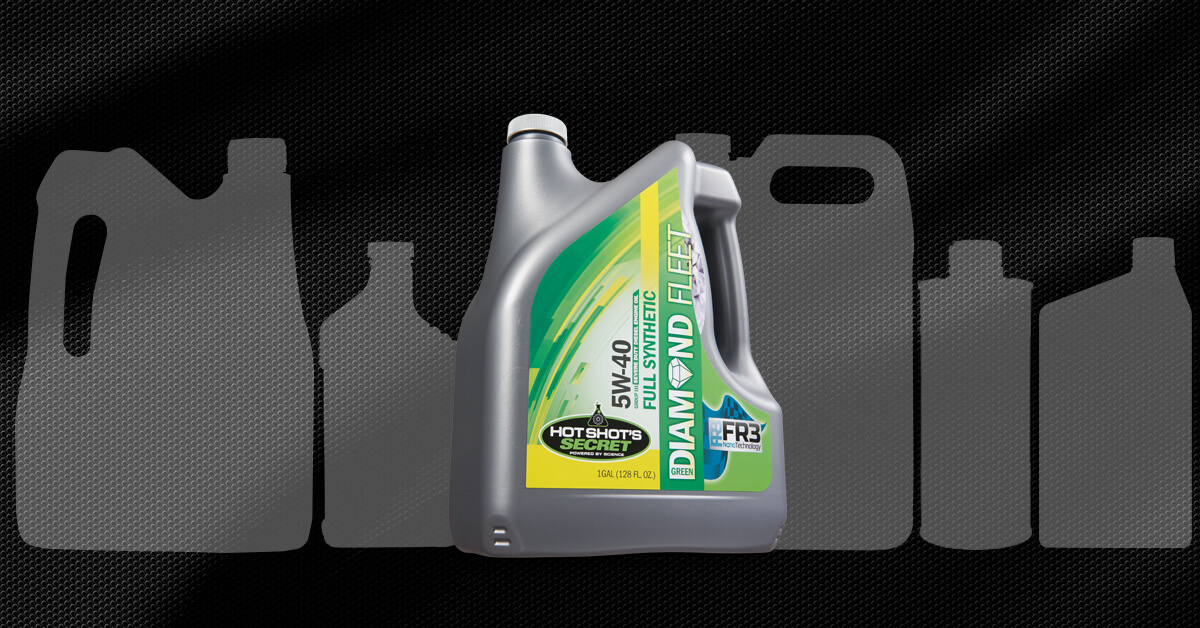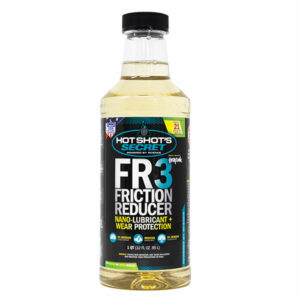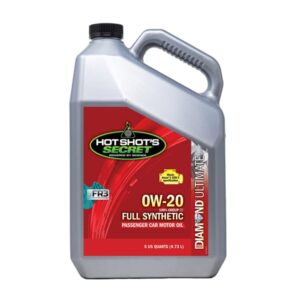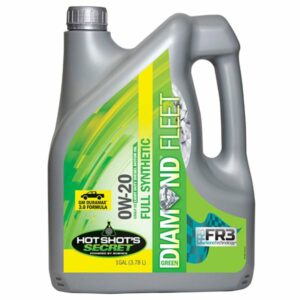
The type of motor oil you put in your vehicle is critical to its continued performance and longevity. With various motor oil types available on the market, it can take some research to determine which product is best for your engine.
Hot Shot’s Secret’s multiple grades and viscosities of motor oils are scientifically tested for optimal performance and extending your engine’s lifespan. Learn more about semi-synthetic vs. synthetic oils here, and discover what both types offer to make the most suitable choice for your vehicle.
Types of Motor Oils
Motor oils reduce friction and wear on your engine’s moving parts. Different types of oil meet various requirements and user needs.
What Is Conventional Motor Oil?
Conventional motor oil consists of a base mineral oil made from refined crude oil, though it’s less refined than synthetic and semi-synthetic oils. It’s recommended for use in older vehicles due to its high viscosity, meaning it moves slowly through an engine. It’s more economical than synthetic oils and is widely available, but it’s generally unsuitable for more modern cars requiring higher performance levels.
What Is Synthetic Oil?
In contrast, synthetic oil is chemically formulated for lower viscosity and greater longevity, making it best for vehicles that see significant long-distance travel and demand top performance. This oil type contains a pure synthetic oil base and additives, and it has a uniform molecular formula. This characteristic means it contains no impurities, and each molecule within the oil is highly refined and tailored for improving engine performance.
What Is Semi-Synthetic Oil?
Semi-synthetic oil is a blend of synthetic and conventional base oils. They can reduce oil consumption, improve protection from wear and maintain a cleaner engine. This blended option performs better than traditional oil but costs less than fully synthetic oil. The formulas vary among brands and specific products.
Semi-Synthetic vs. Full-Synthetic Oil
Although fully synthetic and semi-synthetic formulas both contain synthetic motor oil, they aren’t the same.
Fully synthetic oil’s base formula consists entirely of chemically engineered, purified oil. It offers the best improvements in low-temperature performance, thermal stability and viscosity. However, a premium product comes with a higher price tag.
Semi-synthetics combine conventional and synthetic oils in their base formula, making them less pure and less high-performing than fully synthetic versions. The more synthetic oils a formula has, the better it will perform in terms of longevity and lubricity. Semi-synthetics still offer a higher-quality option than conventional oil, but they aren’t as efficient as fully synthetic formulations.
However, when creating a semi-synthetic oil, there’s no industry-regulated amount of synthetic base oil that must be included for the product to qualify as a semi-synthetic blend. There is variation in how much synthetic oil these blends have, so different brands provide different amounts of protection for your engine.
Which Type of Oil Is Better for You?
Synthetic and semi-synthetic oils provide similar benefits, and knowing them can help you decide if your vehicle requires the greatest improvements possible or if it can run well with moderate enhancements. Consider your specific application alongside the properties of each oil type. Remember to follow the manufacturer’s instructions regarding the type of oil to use in your vehicle.
Some of the benefits of a higher synthetic oil ratio include:
- Oxidation resistance
- Better heat resistance than conventional oil
- Lighter viscosity than conventional oil
- Better performance at low temperatures
If you’re seeking longer-lasting protection or frequently use your vehicle for demanding tasks, fully synthetic oil is the way to go. This pure formulation makes your engine more durable and allows you to go longer between oil changes. Demanding applications like heavy towing in extreme temperatures typically call for synthetic oil because of its higher stability and lower viscosity.
For those who use their vehicle for commuting or regular errands, semi-synthetic may be enough to keep your maintenance expenses down. It is a step up from conventional oil that does not cost as much as fully synthetic oil. Different brands and formulas may offer varying levels of protection.
Synthetic oils are a go-to choice for many vehicle owners, as they build upon the protective qualities and other benefits that semi-synthetic oils provide, giving you an optimal advantage.
Frequently Asked Questions
Hot Shot’s Secret can help you discover the best type of oil for your vehicle. Remember to consult your manufacturer’s guide and with a trusted mechanic to make the most informed decision.
Let’s break down some commonly asked questions regarding semi-synthetic vs. full-synthetic.
What’s the Difference Between Synthetic and Semi-Synthetic Oil?
While comparing fully synthetic vs. semi-synthetic engine oil, consider what degree of performance and protection is most suitable for your vehicle, along with the cost of your choice of oil.
- Synthetic engine oil: Made entirely of chemically engineered, purified oil, synthetic formulations offer superior protection and lubrication. It is ideal for high-performance engines and demanding driving conditions.
- Semi-synthetic engine oil: This type combines synthetic and conventional base oils. It has better cold-weather flow and resistance to oxidation than conventional oil, but it may not work for engines that require full synthetic oil.
Is Full Synthetic or Semi-Synthetic Better?
Full synthetic oil is regarded as the most powerful oil thanks to its pure synthetic oil base, concentrated additives and uniform molecular formula. Choose full synthetic oil if you require optimal performance from your vehicle and don’t mind the higher cost.
However, not all vehicles can take or even need this level of performance. Use semi-synthetic formulations if you desire a good balance of performance and cost. It is great for high-milage, everyday-use cars and trucks.
What Are the Disadvantages of Semi-Synthetic Engine Oil?
There could be uncertainty about the quality of the semi-synthetic oil. Strength and protection can vary depending on the formula’s proportion and the quality of its synthetic base oils. Combat uncertainty by thoroughly researching your semi-synthetic oil of choice.
What Happens If I Use Semi-Synthetic Oil Instead of Fully Synthetic?
Some vehicles require fully synthetic engine oil, so using semi-synthetic oil can diminish the benefits of using synthetic oil and decrease engine protection. The performance is diluted and possibly unpredictable.
Advancements in automotive technology may call for a higher percentage of synthetic oil, meaning fully synthetic formulations are better for high-performing vehicles, such as modern luxury cars and commercial trucks driving long distances.
Is Semi-Synthetic Oil Good for Older Cars?
Yes, semi-synthetic oil can benefit your older car. Most older cars have high mileage, so they can gain from having a higher-viscosity oil. Fully synthetic oil may overload the engine and result in leakage, so semi-synthetic oil is a solid compromise in terms of performance and protection. A bonus of using semi-synthetic engine oil for your older car is that semi-synthetic oil is affordable.
Can I Mix Motor Oils?
If you use fully synthetic oil in an engine that takes semi-synthetic oils, you can see increased benefits due to its improved lubrication and resistance to degradation. However, we don’t recommend mixing oil types or using a semi-synthetic blend in an engine that takes fully synthetic oil, as you may experience diminished performance. As always, follow guidelines from your engine and oil manufacturers.
Choose Hot Shot’s Secret for High-Performance Synthetic Oil
If you’ve decided to use full or semi-synthetic oil in your vehicle to enhance your engine’s performance and protection, Hot Shot’s Secret has the products you need. Enjoy the benefits of science-backed formulas that help extend your engine’s longevity and enable continued performance in any condition.
To learn more about our engine oils and how they can boost your vehicle or fleet, reach out to us for more information.




